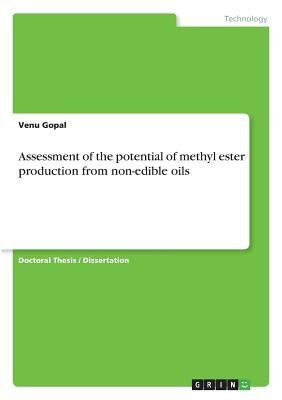
- We will send in 10–14 business days.
- Author: Venu Gopal
- Publisher: GRIN Verlag
- ISBN-10: 3668795762
- ISBN-13: 9783668795761
- Format: 14.8 x 21 x 1.4 cm, minkšti viršeliai
- Language: English
- SAVE -10% with code: EXTRA
Assessment of the potential of methyl ester production from non-edible oils (e-book) (used book) | bookbook.eu
Reviews
Description
Doctoral Thesis / Dissertation from the year 2017 in the subject Environmental Sciences, grade: A, Andhra University (College of engineering), language: English, abstract: Biodiesel as an alternative fuel for diesel engines is becoming increasingly important due to diminishing petroleum reserves and the environmental consequences of exhaust gases from petroleum-fueled engines. Biodiesel, which is made from renewable sources, consists of the simple alkyl esters of fatty acids. As a future prospective fuel, biodiesel has to compete economically with petroleum diesel fuels. A two-step transesterification process (Sequential esterification and transesterification process) was used to prepare methyl ester (biodiesel) from high free fatty acid (FFA) content oils. For the yield of high FFA, two-step acid-base catalyzed method has been developed which consists of acid-catalyzed pretreatment/esterification step to reduce the FFA to less than 1% using H2SO4 as an acid catalyst and transesterification of pretreated oil to biodiesel using alkali catalyst. In the present study, the main focus is being placed to explore the non-edible oil resources like Used Cooking Oil (UCO), Cottonseed oil, Jatropha (Jatropha curcas) oil, Neem(Azadirachta indica) oil as a potential source for biodiesel. Experimental results from enzyme (lipase) catalyzed method for selected oils using influencing parameters such as reaction time and catalyst weight, experimental results from acid-alkaline catalyzed methods using common influencing parameters such as methanol to oil molar ratio, catalyst weight, reaction temperature and reaction time for above-mentioned oils were compared using batch mode. Methyl ester (biodiesel) yield range of 66.20-71.6% was attained for an enzyme-catalyzed method, whereas for acid-alkaline the yield range was 84.4-91.6%. This gives the indication of further refinement in the enzyme-catalyzed transesterification process. However, enzyme-catalyzed biodiesel production has so
EXTRA 10 % discount with code: EXTRA
The promotion ends in 21d.23:01:29
The discount code is valid when purchasing from 10 €. Discounts do not stack.
- Author: Venu Gopal
- Publisher: GRIN Verlag
- ISBN-10: 3668795762
- ISBN-13: 9783668795761
- Format: 14.8 x 21 x 1.4 cm, minkšti viršeliai
- Language: English English
Doctoral Thesis / Dissertation from the year 2017 in the subject Environmental Sciences, grade: A, Andhra University (College of engineering), language: English, abstract: Biodiesel as an alternative fuel for diesel engines is becoming increasingly important due to diminishing petroleum reserves and the environmental consequences of exhaust gases from petroleum-fueled engines. Biodiesel, which is made from renewable sources, consists of the simple alkyl esters of fatty acids. As a future prospective fuel, biodiesel has to compete economically with petroleum diesel fuels. A two-step transesterification process (Sequential esterification and transesterification process) was used to prepare methyl ester (biodiesel) from high free fatty acid (FFA) content oils. For the yield of high FFA, two-step acid-base catalyzed method has been developed which consists of acid-catalyzed pretreatment/esterification step to reduce the FFA to less than 1% using H2SO4 as an acid catalyst and transesterification of pretreated oil to biodiesel using alkali catalyst. In the present study, the main focus is being placed to explore the non-edible oil resources like Used Cooking Oil (UCO), Cottonseed oil, Jatropha (Jatropha curcas) oil, Neem(Azadirachta indica) oil as a potential source for biodiesel. Experimental results from enzyme (lipase) catalyzed method for selected oils using influencing parameters such as reaction time and catalyst weight, experimental results from acid-alkaline catalyzed methods using common influencing parameters such as methanol to oil molar ratio, catalyst weight, reaction temperature and reaction time for above-mentioned oils were compared using batch mode. Methyl ester (biodiesel) yield range of 66.20-71.6% was attained for an enzyme-catalyzed method, whereas for acid-alkaline the yield range was 84.4-91.6%. This gives the indication of further refinement in the enzyme-catalyzed transesterification process. However, enzyme-catalyzed biodiesel production has so


Reviews